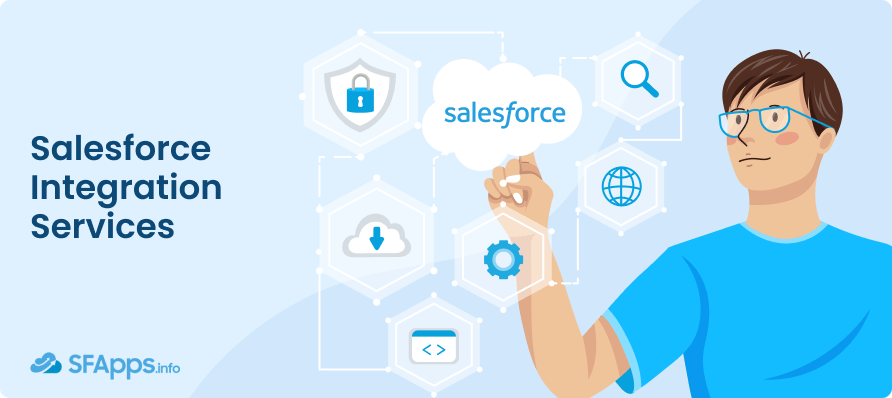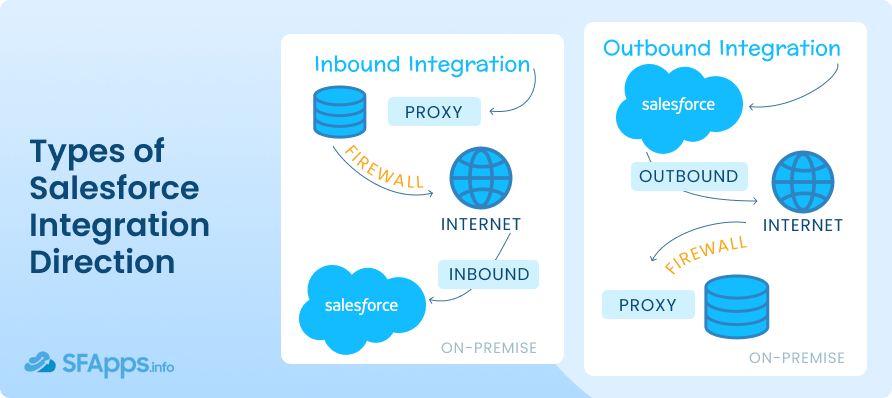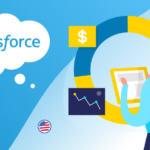
Introduction
Making your business run smoothly and keeping your customers happy are crucial for success. Salesforce, a top-notch customer relationship management (CRM) platform, helps you do just that. However, to get the most out of Salesforce, it needs to work well with your other business systems. This integration helps everything flow better, saves time, and reduces mistakes.
Imagine a retail company using Salesforce to manage customer interactions and NetSuite for financial operations. Without integration, the sales team might spend hours manually updating financial records, leading to delays and errors. With a good Salesforce NetSuite Integration, data from Salesforce syncs automatically with NetSuite, keeping financial information up-to-date and accurate. This saves time and cuts down on errors.
Insight:
For a better understanding of Salesforce Integrations, you can not only read the documentation but also try to pass Salesforce Trailhead modules for Salesforce Integrations.
Finding the right specialized Salesforce integration service can be tough. There are many options out there, each claiming to be the best. How do you choose the right one? This guide will help you with a clear checklist to ensure you find the best service for your needs.
Understanding Salesforce Integration Services
Salesforce integration services help connect your Salesforce CRM with other important business systems, making sure data flows smoothly between them. This integration is key to having a complete view of your operations, boosting efficiency, and making better decisions.
What Are Salesforce Integration Services?
Salesforce integration services involve linking Salesforce with other software applications like ERP systems, marketing tools, and financial software. This connection ensures that data entered in one system is automatically updated in others, reducing the need for manual data entry and minimizing errors.
Types of Systems That Can Be Integrated with Salesforce
Salesforce is designed to easily connect with various business software, whether they are cloud-based or on-premises. Here are some common systems that integrate with Salesforce:
#1 Accounting:
Integrating Salesforce with accounting software lets you sync financial data with your CRM. This helps sales teams create detailed customer profiles, handle invoices accurately, and simplify budget planning and sales forecasting.
#2 ERP Systems:
Connecting Salesforce with ERP systems like SAP or Oracle syncs customer data, orders, and inventory. This helps sales reps keep clients updated on orders and shipments and provides real-time data for better manufacturing planning.
#3 Marketing Automation Tools:
Integrating with tools like Marketo or HubSpot allows sales and marketing teams to collaborate better through automated data exchange. This improves tracking of new leads and enhances product pricing, customer outreach, lead nurturing, and engagement strategies.
#4 Ecommerce Platforms:
Ecommerce integration with Salesforce gives retailers deeper insights into customer interactions. This helps improve upselling, cross-selling strategies, marketing campaigns, and customer service, leading to more personalized experiences.
#5 Computer Telephony:
Connecting call center software with Salesforce CRM speeds up and improves sales operations. This integration brings phone features into Salesforce, allowing agents to quickly identify and route calls, personalize conversations, and record them for future use.
#6 Social Media:
Integrating with social media platforms gives sales agents access to customers’ social media activities, providing insights into their interests and needs. This helps tailor engagement strategies to meet customer expectations.
#7 Collaboration Tools:
Integrating collaboration tools with Salesforce prevents data duplication and makes work easier for sales agents by creating a single source of truth. For example, using SharePoint as a document library for Salesforce can streamline document sharing and collaboration. For more information, check out this SharePoint Integration Salesforce.
#8 Email & Calendar:
Syncing contacts, emails, tasks, and calendars between Salesforce CRM and work email and calendar apps simplifies planning and communication, increasing coordination and productivity for sales agents.
#9 Project & IT Service Management Software:
Integrating Salesforce with IT support solutions streamlines ticket creation and collaboration between sales, service agents, and tech teams, ensuring quicker and clearer resolution of customer issues.

Key Factors to Consider When Choosing Salesforce Integration Services
Selecting the best Salesforce integration services requires careful evaluation of several key factors. Here’s what to consider to ensure you make the right choice:
Expertise and Experience
The provider’s expertise and experience in Salesforce integration are crucial. Look for a company with a proven track record and a portfolio of successful integrations. Check case studies and client testimonials to gauge their capability.
For example, a provider with extensive experience in legacy data integration can handle complex integrations seamlessly.
Customization and Scalability
Your business needs are unique, and the integration service should be able to tailor solutions to meet those needs. Ensure that the provider offers customizable integration options that can scale as your business grows. Whether it’s a small tweak or a significant overhaul, the service should adapt to your requirements.
Security and Compliance
Data security is a key. Verify that the provider follows industry best practices for data security and complies with relevant regulations. This includes encryption, secure data transfer protocols, and adherence to compliance standards such as GDPR or HIPAA, depending on your industry.
Customer Support and Service Level Agreements (SLAs)
Reliable customer support is essential for ongoing maintenance and troubleshooting. Check the provider’s support options and ensure they offer clear SLAs. This guarantees timely assistance and minimizes downtime in case of any issues.
Cost and Budget
While cost shouldn’t be the only deciding factor, it’s important to find a service that fits within your budget. Compare the pricing models of different providers and ensure that there are no hidden costs. A transparent pricing structure will help you plan your budget effectively.
Real-Life Example
A professional services company providing Salesforce Dynamics CRM integration benefited greatly from choosing a provider with a deep understanding of both platforms. This allowed for a smooth data flow between their CRM and business management systems, enhancing overall efficiency and client management.
By considering these factors, you can select the best Salesforce integration service that aligns with your business goals and ensures a smooth and efficient integration process.
Popular Salesforce Integrations
Integrating Salesforce with other systems can significantly enhance your business operations. Here are some popular integrations that can make a big difference:
Salesforce and SharePoint Integration
Connecting Salesforce with SharePoint can streamline document management and collaboration. This integration allows your team to access, share, and manage documents directly within Salesforce, enhancing productivity and ensuring that everyone has access to the most up-to-date information.
- Benefits: Improved document management, streamlined collaboration, enhanced productivity.
- Use Case: A professional services firm used Salesforce and SharePoint integration to centralize their document management, reducing time spent searching for files and improving team collaboration.
Salesforce and Marketing Automation Integration
Integrating Salesforce with marketing automation tools like HubSpot or Marketo helps align sales and marketing efforts. This integration provides a seamless flow of data between marketing campaigns and sales activities, ensuring that leads are nurtured effectively and sales teams have access to the latest marketing insights.
- Benefits: Better lead management, improved marketing ROI, enhanced sales-marketing collaboration.
- Use Case: A B2B company integrated Salesforce with HubSpot to automate lead nurturing, resulting in a 30% increase in qualified leads and improved sales efficiency.
Salesforce and eCommerce Integration
For retail businesses, integrating Salesforce with eCommerce platforms like Shopify or Magento can provide a unified view of customer data and sales transactions. This integration helps in personalizing customer experiences, optimizing inventory management, and improving sales strategies, find more details in the Salesforce Shopify Migration.
- Benefits: Unified customer view, personalized shopping experiences, optimized inventory.
- Use Case: An online retailer integrated Salesforce with Shopify to sync customer data and order information, allowing for personalized marketing campaigns and better inventory management.
Salesforce and Accounting Software Integration
Connecting Salesforce with accounting software such as QuickBooks or Xero ensures accurate financial data in your CRM. This integration streamlines financial processes, improves invoice management, and enhances sales forecasting.
- Benefits: Accurate financial data, streamlined invoicing, improved financial forecasting.
- Use Case: A small business integrated Salesforce with QuickBooks to automate invoice generation and sync financial data, resulting in more accurate financial reports and reduced manual work.
Salesforce and ERP Integration
Integrating Salesforce with ERP systems like SAP or Oracle provides a comprehensive view of business operations, from customer interactions to backend processes. SAP Salesforce integration ensures that sales and operations teams are aligned, with real-time data on inventory, orders, and production schedules.
- Benefits: Comprehensive business view, real-time data access, improved operational efficiency.
- Use Case: A manufacturing company integrated Salesforce with SAP to sync sales orders with production schedules, improving delivery times and customer satisfaction.
By leveraging these integrations, businesses can optimize their operations, improve customer relationships, and drive growth.

Common Challenges When Finding the Best Salesforce Integration Services
Finding the best Salesforce integration services can be a complex process with several potential challenges. Understanding these common obstacles and their solutions can help you navigate the selection process more effectively.
Identifying the Right Provider
⚠️ Market Saturation: The abundance of providers can make it difficult to identify the best one for your needs. Many companies claim to be experts, but their capabilities may vary significantly.
✔️ Solution: Conduct thorough research and shortlist providers based on detailed criteria such as expertise, case studies, and client reviews. Attend industry events and seek recommendations from trusted sources.
⚠️ Lack of Transparency: Some providers may not be upfront about their capabilities or limitations, making it hard to gauge their true expertise.
✔️ Solution: Request detailed proposals and ask specific questions about their methods, past projects, and limitations. Insist on clear and open communication from the start.
Assessing Technical Expertise
⚠️ Specialized Knowledge: Not all providers have the specialized knowledge required for certain integrations, such as connecting Salesforce with complex legacy systems.
✔️ Solution: Look for providers with proven experience in your specific integration needs. Ask for examples of similar projects they have completed successfully.
⚠️ Keeping Up with Updates: Salesforce frequently updates its platform, and not all providers stay current with these changes, which can affect the integration’s longevity and effectiveness.
✔️ Solution: Choose providers who demonstrate a commitment to continuous learning and staying current with Salesforce updates. Check if they offer regular training for their team.
Customization Limitations
⚠️ Rigid Solutions: Some providers offer rigid, one-size-fits-all solutions that may not address specific business needs or allow for future growth and changes.
✔️ Solution: Select a provider known for offering flexible, tailored solutions. Ensure they are willing to understand your unique requirements and adapt their approach accordingly.
⚠️ Inadequate Customization: The inability to customize integration solutions can lead to inefficient workflows and the inability to leverage Salesforce’s full potential.
✔️ Solution: Work closely with the provider to outline your specific needs. Ensure they can provide custom integration options that align with your business processes and goals.
Security Concerns
⚠️ Data Vulnerability: Integrating multiple systems increases the risk of data breaches if the provider does not implement robust security measures.
✔️ Solution: Verify the provider’s security protocols, including encryption, secure data transfer methods, and regular security audits. Ensure they follow best practices for data protection.
⚠️ Compliance Issues: Ensuring compliance with various data protection regulations (e.g., GDPR, HIPAA) can be challenging, especially if the provider is not well-versed in these laws.
✔️ Solution: Ensure the provider is knowledgeable about relevant compliance regulations and has experience working within those frameworks. Ask for examples of how they have ensured compliance in past projects.
Budget Constraints
⚠️ Hidden Costs: Unexpected expenses can arise during the integration process, such as additional licensing fees or costs for custom development work.
✔️ Solution: Request a detailed cost breakdown and ensure all potential expenses are covered in the initial quote. Clarify any areas of uncertainty to avoid unexpected costs later.
⚠️ Cost vs. Value: Balancing cost with the value provided can be difficult. Cheaper options might lack essential features or support, while more expensive services may offer more than what is necessary.
✔️ Solution: Balance your budget with the value provided. Focus on the long-term benefits and return on investment, rather than just the upfront costs.
Integration Complexity
⚠️ System Compatibility: Ensuring compatibility between Salesforce and existing systems can be complex, particularly with older or proprietary software.
✔️ Solution: Conduct a thorough compatibility analysis between Salesforce and your existing systems. Choose a provider with experience in handling similar integrations.
⚠️ Data Migration Issues: Migrating data from legacy systems to Salesforce can be fraught with challenges, including data loss, duplication, and integrity issues.
✔️ Solution: Plan and execute a detailed data migration strategy. Ensure the provider has robust tools and methods for data validation, cleaning, and synchronization.
Support and Maintenance Challenges
⚠️ Inconsistent Support: Providers may offer varying levels of support, and inconsistent or inadequate support can lead to prolonged downtime and unresolved issues.
✔️ Solution: Check the provider’s support options and ensure they offer 24/7 support if necessary. Verify their response times and the quality of their customer service.
⚠️ Ongoing Maintenance: Integration is not a one-time task; it requires ongoing maintenance to ensure smooth operation, which some providers may not offer adequately.
✔️ Solution: Ensure the provider offers comprehensive maintenance services. Discuss post-integration support plans and regular system check-ups to keep the integration running smoothly.
Understanding these challenges and implementing these solutions can help you find the best Salesforce integration service that meets your business requirements and ensures a smooth, secure, and efficient integration process.
Wrapping Up: Finding Your Best Salesforce Integration Service
Choosing the right Salesforce integration services is essential for optimizing your business operations and ensuring seamless data flow between your systems. By understanding the common challenges and applying the solutions outlined in this guide, you can make an informed decision that aligns with your specific needs and goals.
In the search for the best Salesforce integration services, it’s important to conduct thorough research, seek recommendations, and ensure transparency in providers’ capabilities and limitations. Look for specialized knowledge and a commitment to staying updated with Salesforce’s latest features and updates. Ensure the provider offers flexible solutions tailored to your business and can scale as your needs grow.
Verify robust data protection measures and compliance with relevant regulations. Understand the full cost, avoid hidden fees, and balance costs with the long-term value provided. Plan for system compatibility and data migration challenges with a detailed strategy. Ensure consistent, high-quality support and comprehensive maintenance services.
By following these steps, you can confidently select a Salesforce integration service that will enhance your business efficiency, improve customer relationship management, and drive growth. Whether you are looking for Salesforce integration services in USA or globally, a well-integrated system is a strategic move towards better data management, increased productivity, and a stronger competitive edge.
For those seeking Salesforce CRM integration services or Salesforce cloud integration services, remember that the right provider can make all the difference. When you decide to hire Salesforce integration services, ensure they can meet your specific needs and provide ongoing support to maintain seamless operations.
Thank you for following this guide, and best of luck with your Salesforce integration! Ready to start your integration journey? Begin by evaluating potential providers today and set your business on the path to seamless integration success.

Dorian is a 6X Certified Salesforce Developer and Administrator with a start in the IT world as a CRM Admin in 2020. Since diving into Salesforce in 2021 via Trailhead and Focus on Force, he has achieved a Ranger Rank, earned several Superbadges, and bagged certifications including the Salesforce Certified Administrator, Platform App Builder, Associate and Platform Developer I by 2023. In 2024 he also became Salesforce Certified AI Associate and earned Certified AI Specialist Certification in 2025. Dorian is very keen on continuous learning, always looks for fresh ways to improve his knowledge. He enjoys running, boxing, kickboxing and reading diverse kinds of books in his free time.


 Previous Post
Previous Post Next Post
Next Post
One Response to “Finding the Best Salesforce Integration Services: Your Checklist”